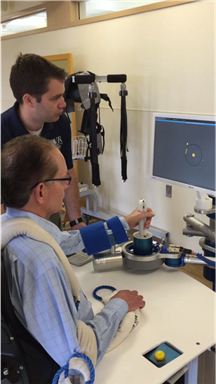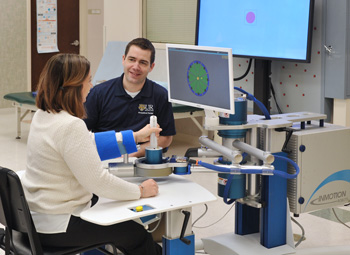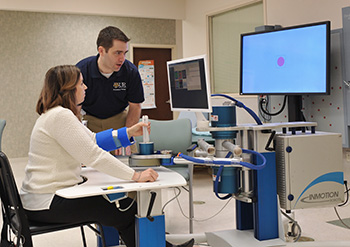Research
The URNI fosters programs of research in collaboration with investigators in the Del Monte Institute of Neuroscience and across the University of Rochester that lead to translational research studies and clinical trials. Our key research areas will include devices, novel occupational and physical therapy, pain treatment, stem cells, integrative medicine, and health services.
A Few Accomplishments

Dr. Brad Berk using InMotion robot.
Developing a novel research platform using a robotic device to improve paralysis including strength, dexterity, and range of motion
The URNI is a founding member of NeuroCuresNY, a New York state sponsored $5 million research network involving the URNI, Columbia University, Burke Neurological Institute at Cornell University, and National Center for the Adaptive Technology at Albany Veterans Hospital. The network will test the ability of a novel upper extremity robot trainer to more rapidly and accurately measure the benefit of drugs and devices on recovery from paralysis. In the first clinical trial, we will test the benefit of transcranial magnetic stimulation on functional recovery. Future trials will test new drugs for their ability to restore neurological function. Dr. Benesch has joined the NeuroCuresNY board and is working alongside Dr. Berk conducting translational research in stroke and SCI.
Receiving a grant from the Department of Defense (DoD) for peripheral nerve research
This study will test a new anti-inflammatory drug to improve functional recovery and decrease pain from sciatic nerve injury in a rodent model. The first DoD grant received by the URNI will provide $750,000 for this preclinical study. Our post-doctoral fellow, George Hsu, Ph.D., will assist with this project.
Continuing to grow our team of researchers:
- Robert Holloway, M.D., M.P.H., studies experimental therapeutics and outcomes research covering many areas of neurology. He is the PI on several institutional awards that support clinical trial research and career development.
- Curtis Benesch, M.D., M.P.H., is an expert in experimental therapeutics and participates in multiple acute and prevention stroke trials.
- Debra Roberts, M.D., Ph.D., is an expert in quality and safety who investigates causes of and mitigation efforts to minimize errors and promote optional outcomes and recovery.
 Ania Busza, M.D., Ph.D., is investigating post-stroke motor recovery and imaging biomarkers and technology to enhance intervention effects.
Ania Busza, M.D., Ph.D., is investigating post-stroke motor recovery and imaging biomarkers and technology to enhance intervention effects.- Thomas Mattingly, M.D., M.Sc., continues to investigate the role of hypothermia (cooling) to protect the brain during a stroke.
- Adam Kelly, M.D., is an expert in quality measurement in post-stroke care, as well as exploring ways to improve decision-making to promote person-centered care.
- Imad Khan, M.D., is investigating neurological recovery and outcomes in patients undergoing extracorpeal membrane oxygenation (ECMO) in patients with severe cardiorespiratory collapse, as well as clinical trials in traumatic brain injury.
- Bogachan Sahin, M.D., Ph.D., is investigating cortical visual field deficits after stroke and novel ways of promoting recovery after stroke.
 Giovanni Schifitto, M.D., M.S., has major research interests in the development and implementation of novel neuroimaging biomarkers applied in the investigation and treatment of, neuroinflammatory, neurodegenerative and cerebrovascular disorders.
Giovanni Schifitto, M.D., M.S., has major research interests in the development and implementation of novel neuroimaging biomarkers applied in the investigation and treatment of, neuroinflammatory, neurodegenerative and cerebrovascular disorders.- Maiken Nedergaard, M.D., DMSc, is investigating how the brain’s glymphatic system cleans itself of toxic substances and restores normal function.
- Steven Goldman, M.D., Ph.D., continues to investigate stem cell therapies to repopulate the brain and replace damaged tissue.
- Mark Noble, Ph.D., is developing cell-based therapies for treating spinal cord injury, and pharmacological enhancement of repair by endogenous cells.
- Christoph Pröschel, Ph.D., is studying how disruption of the microenvironment at the injury site in SCI and neurodegenerative diseases of the central nervous system prevents nerves from re-growing or reconnecting with undamaged nerves.
- John Leckenby, M.B.B.S., Ph.D., will focus his research on peripheral nerve dysfunction in trigeminal neuralgia, Bell’s palsy, and syndrome after carpal tunnel.
- Our collaborations continue to grow with additional research focused on spinal cord, peripheral neuropathy, and TBI working with Dr. Heather Ma.
- Krystel Huxlin, Ph.D., Huxlin Lab performs functional imaging of visual function, plasticity and rehabilitation after brain damage.